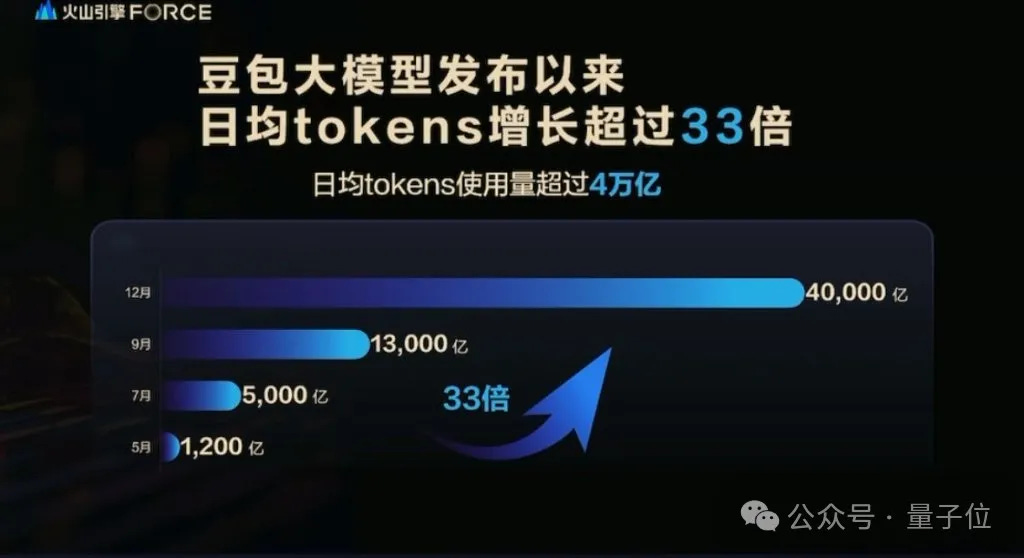Greetings from a world where…
hope is a discipline
…As always, the searchable archive of all past issues is here. Please please subscribe here to support ChinAI under a Guardian/Wikipedia-style tipping model (everyone gets the same content but those who can pay support access for all AND compensation for awesome ChinAI contributors).
Feature Translation: The True Unicorns? 1 billion tokens/day Users
Context: It is relatively easy to track breakthrough innovations; it takes a lot more work to trace the process by which AI diffuses across a wide range of applications sectors. This week, Lily Li contributes a QbitAI report translation that tackles the latter. A recent graduate of University of Toronto with a PhD in theoretical computer science, she is making the transition to the AI safety field through projects in technical and governance research.
Key Takeaways: The central question: If we use daily average consumption of 1 billion tokens as a threshold for “beginner-level” of large language model adoption, what can we learn about the diffusion of AI in China?
Based on their analysis of 2024 market trends, QbitAI estimates that “there are at least 200 Chinese companies which have exceeded this threshold.”
For a conversational AI model, one billion tokens = one million conversations; another way to represent one billion tokens is the content of 2,000 copies of Dream of the Red Chamber (a classic of Chinese literature).
ByteDance’s Doubao LLM app has reported some very impressive daily token usage numbers
From the article: “In July 2024, the average daily token usage of Doubao by its corporate customers increased 33 fold. In December, ByteDance revealed that the average daily token usage of Doubao exceeded 4 trillion tokens.”

Additional Takeaways from Lily:
The importance of a startup is judged by its valuation. The article suggests that, for AI adopters, the comparable metric should be the average number of tokens used in a day. Important AI adopters are those who use more than one billion tokens everyday. In China there are now more than 200 such companies. The article goes through several examples (e.g. Homework Helper, Dream Island, OPPO, Volcano Engine, etc.) in a variety of different fields and discusses their use cases.
A person living in the west --- myself included --- has very little exposure to many of these customer-facing devices and services to say nothing of the business-facing ones. It was informative to see a sketch of the ecosystem growing in parallel to the one we know.
FULL TRANSLATION: In the AI era, don’t look at unicorns, look at daily consumers of 1 billion tokens
ChinAI Links (Four to Forward)
We’ve done a lot of “who’s winning” recommendations lately. Let’s mix things up a little.
Must-read: Promising Topics for US–China Dialogues on AI Safety and Governance
Lead-authored by Saad Siddiqui, a new Oxford Martin School policy paper that outlines potential areas of common ground (“low-hanging fruit”) for US-China dialogues on AI safety and governance. This draws on an analysis of 44 documents issued by actors such as the US government, US AI developers, the Chinese government, Chinese legal experts, and Chinese AI developers. Fun to see a few former ChinAI contributors come together on this one (I played a very minor, supervisory role)
Should-read: What do we know about China’s new AI safety institute?
For DigiChina, Caroline Meinhardt and Graham Webster break down what we know about the China AI Safety and Development Association, its version of an AI safety institute, which seems to function as a consortium of existing research institutions.
Should-read: DeepSeek and Other Chinese Firms Converge with Western Companies on AI Promises
Scott Singer, for Carnegie Endowment for International Peace, provides an important update on a growing “surprising consensus among AI developers in both countries around the need for safeguards.” Some great details about the Chinese AI Safety Commitments announced in December 2024 by the China Academy for Information and Communications Technology (and their similarity to the Seoul Commitments)
Should-read: China in a World of Orders — Rethinking Compliance and Challenge in Beijing's International Relations
It’s remarkable how often Alastair Iain Johnston’s work on China makes me view things from a completely different lens. His hit rate is incredible.
Thank you for reading and engaging.
These are Jeff Ding's (sometimes) weekly translations of Chinese-language musings on AI and related topics. Jeff is an Assistant Professor of Political Science at George Washington University.
Check out the archive of all past issues here & please subscribe here to support ChinAI under a Guardian/Wikipedia-style tipping model (everyone gets the same content but those who can pay for a subscription will support access for all).
Also! Listen to narrations of the ChinAI Newsletter in podcast format here.



To supplement your continuing coverage of R1, the following report provides insights into s1 and DeepSeek-R1 that you may find valuable:
From Brute Force to Brain Power: How Stanford's s1 Surpasses DeepSeek-R1
https://papers.ssrn.com/sol3/papers.cfm?abstract_id=5130864